|
The pictures are arranged
by Family.
Return to
Native Plants page. |
__________________________________________________________________________________________________
VINES |
|
ASCLEPIADACEAE -
Milkweed Family |
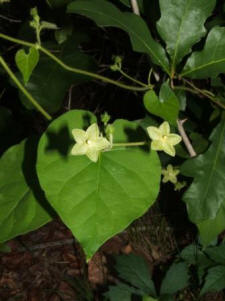
Pearl milkvine - Matelea
reticulata
This delicate vine is often overlooked on a hike through the
woods; although it can climb up to 12' into a tree! The unassuming
star-shaped green flowers have reticulate veins & pearly stamen column.
The heart-shaped leaves would create an additional interest in a
landscape setting.
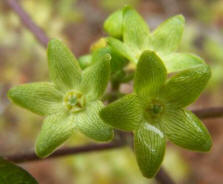 |
|
|
CAPRIFOLIACEAE - Honeysuckle Family |
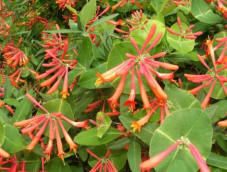
Coral honeysuckle - Lonicera
sempervirens
This beautiful drought-tolerant honeysuckle is a favorite of
hummingbirds. It is filled with flowers that stand just above oval
fused terminal leaves. It makes a nice background interest on a
fence or in a corner. The vine is well-mannered & does not take
over like some other vines. It is also sometimes called Evergreen
honeysuckle because it doesn't lose its leaves in the winter. |
|
|
MENISPERMACEAE - Moonseed Family |
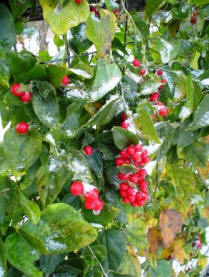
Carolina snailseed - Cocculus
carolinus
You may find this vigorous vine growing in your lawn, & you can
definitely find it in pastures & other sunny locations. It will climb a
fence & completely cover it. So if you need to hide an ugly fence,
this is the vine for you! The birds like the fruit of the
snailseed too! |
|
|
RHAMNACEAE - Buckthorn Family |
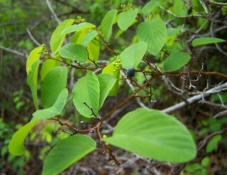
Rattanvine - Berchemia scandens
This vine can climb high & it twines, giving it its name
"rattan." It can even become a twining vine-shrub. It is
found in thickets or woods, near stream bottoms & slopes. The
leaves are reminiscent of Carolina buckthorn leaves, which is in the
same family. It produces bluish fruit that stands in contrast against
the bright green leaves. |
|
|
VITACEAE - Grape Family |
|
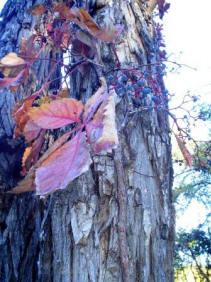
Virginia creeper -
Parthenocissus quinquefolia
Virginia creeper grows up into trees & makes an interesting
focal point along the trunk of a tree. In the fall, they turn
brilliant fall colors & put out bluish fruit. This beautiful
native vine is a good substitution for Boston Ivy or other non-native,
aggressive vines in landscapes.
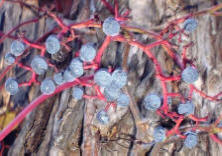
|
|
|
| This listing of native
plants of the Cross Timbers eco-region is not comprehensive. This
is merely a compilation of some plants that can be found locally in
lawns, parks, development sites, and natural areas. If you keep
your eyes to the ground, you'll be surprised at what you might find!
With water conservation in our urban areas
becoming increasingly more important, native plants in our landscapes
can help us save our precious water. Native plants grow naturally
in our soils, climate & unpredictable weather. They are
drought-tolerant and need little attention. Some of these native
plants may not be available in most local nurseries, however, you might
try calling nurseries that specialize in native plants. You always
have the option of propagating these plants from seed or vegetatively.
If nothing else, knowing some native plants will help you appreciate
their role in our environment and urban settings.
Some good resources for ID & to learn
more about native plants of Texas are:
Shinners & Mahler's Illustrated Flora of North Central Texas
by George M. Diggs, Jr., Barney L. Lipscomb,
& Robert J. O'Kennon
Wildflowers of Texas by Geyata Ajilvsgi
Wildflowers of the Texas Hill Country by Marshall Enquist
Texas Wildflowers by Campbell & Lynn Loughmiller
Trees of North Texas by Robert A. Vines
Trees of Texas by Carmine Stahl & Ria McElvaney
Grasses of the Texas Hill Country by Brian & Shirley
Loflin
Common Texas Grasses: An Illustrated Guide by Frank W.
Gould
Texas Wildscapes: Gardening for Wildlife by
Noreen Damude and Kelly Conrad Bender
Landscaping with Native
Plants of Texas by George Oxford Miller
How to Grow Native Plants of Texas & the Southwest by Jill
Nokes
Find out how community volunteers can
take an area that was formerly neglected and overgrown with invasive,
exotic privet and return the site to the Eastern Cross Timbers
ecosystem. Visit the
Molly Hollar
Wildscape website to learn more.
Return to Native
Plants page.
|